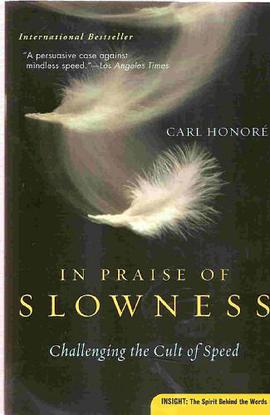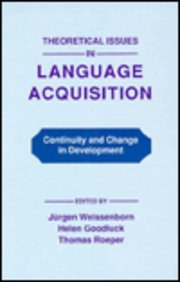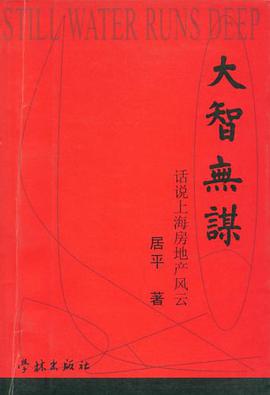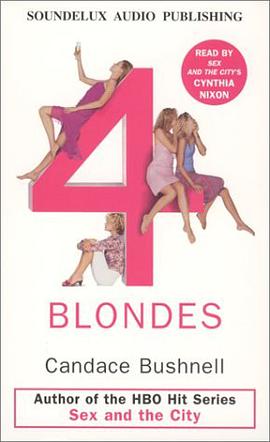

具体描述
We live in the age of speed. We strain to be more efficient, to cram more into each minute, each hour, each day. Since the Industrial Revolution shifted the world into high gear, the cult of speed has pushed us to a breaking point. Consider these facts: Americans on average spend seventy-two minutes of every day behind the wheel of a car, a typical business executive now loses sixty-eight hours a year to being put on hold, and American adults currently devote on average a mere half hour per week to making love.
Living on the edge of exhaustion, we are constantly reminded by our bodies and minds that the pace of life is spinning out of control. In Praise of Slowness traces the history of our increasingly breathless relationship with time and tackles the consequences of living in this accelerated culture of our own creation. Why are we always in such a rush? What is the cure for time sickness? Is it possible, or even desirable, to slow down? Realizing the price we pay for unrelenting speed, people all over the world are reclaiming their time and slowing down the pace - and living happier, healthier, and more productive lives as a result. A Slow revolution is taking place.
Here you will find no Luddite calls to overthrow technology and seek a preindustrial utopia. This is a modern revolution, championed by cell-phone using, e-mailing lovers of sanity. The Slow philosophy can be summed up in a single word - balance. People are discovering energy and efficiency where they may have been least expected - in slowing down.
In this engaging and entertaining exploration, award-winning journalist and rehabilitated speedaholic Carl Honoré details our perennial love affair with efficiency and speed in a perfect blend of anecdotal reportage, history, and intellectual inquiry.
作者简介
SEE BELOW FOR Q&A ON CARL's LATEST BOOK, BOLDER: MAKING THE MOST OF OUR LONGER LIVES
Carl Honoré is a bestselling author, broadcaster and the voice of the Slow Movement. His first TED talk in praise of slowness has been viewed three million times. He will return to the TED main stage in July 2019.
His first book, In Praise of Slow(ness), chronicles the global trend toward putting on the brakes in everything from work to food to parenting. The Financial Times said it is "to the Slow Movement what Das Kapital is to communism."
His second book, Under Pressure, explores how to raise and educate children in a fast world and was hailed by Time as a "gospel of the Slow Parenting movement."
His third book, The Slow Fix, explores how to tackle complex problems in every walk of life, from health and relationships to business and politics, without falling for superficial, short-term quick fixes.
His latest book, Bolder: Making The Most Of Our Longer Lives, explores aging - how we can do it better and feel better about doing it. It's also a spirited manifesto against ageism.
Published in 34 languages, his books have landed on bestseller lists in many countries. In Praise of Slow was a BBC Radio 4 Book of the Week and the inaugural choice for the Huffington Post Book Club. It also featured in a British TV sitcom, Argentina's version of Big Brother and a TV commercial for the Motorola tablet.
Under Pressure was shortlisted for the Writers' Trust Award, the top prize for non-fiction in Canada. Bolder was a BBC Radio 4 Book of the Week and a Reader's Digest (UK) Book of the Month.
Carl featured in a series for BBC Radio 4 called The Slow Coach in which he helped frazzled, over-scheduled people slow down. He also presented a television show called Frantic Family Rescue on Australia's ABC 1.
Q&A on BOLDER:
What is BOLDER about?
Ageing - how we can do it better and feel better about doing it. It's also a rallying cry against the last form of discrimination that dare speak its name: ageism.
Is there a particular age group the book is aimed at?
Not at all. It's for anyone of any generation who is pondering (or worrying about) what it means to grow older. I wish there had been a book like this around when I was 30: it would have saved me two decades of anxiety and dread!
What inspired you to write the book?
I was at a hockey tournament, and playing well, when I discovered I suddenly was the oldest player there. For some reason the news shook me to the core. I began wondering whether I looked out of place, whether people were laughing at me, whether I should take up a more gentle pastime, like Bingo. It got me thinking about how we often feel ashamed and afraid of growing older. How we imagine it's all about loss, decline, decrepitude and sadness. Is it any wonder that "age" is the number one answer that comes up on Google Search when you type in "I lie about my..."? After the shock at that hockey tournament, I wanted to know if there was another, happier story to tell about ageing. Full disclosure: I wrote BOLDER to help myself feel better about my own advancing years.
Did it work?
Yes, it did! I feel a million times better about growing older than I did when I began the research. Why? Because so many of my own downbeat assumptions about ageing turned out to be wrong. And because - and this is the really exciting bit - so many things can get better as we grow older.
Such as?
The thing that really blew me away is that people are generally more contented in later life. Across the world happiness seems to follow a U-shaped curve, bottoming out in middle age and then rising again thereafter. Even Pete Townshend confessed to feeling more cheerful in his 60s than he was when he wrote one of the most ageist lines in the pop music canon: 'Hope I die before I get old.' We becomes more comfortable in our own skin and less worried about what others think of us. We tend to form stronger, more fulfilling relationships as we age. Ageing also makes many of us more altruistic and eager to serve the common good.
Doesn't ageing kill off romance and sex?
Not necessarily. Another part of my research that startled me (in a good way) was discovering just how many people are falling head over heels and/or enjoying great sex in later life. The conventional wisdom that romance and bedroom fireworks belong to the young is flat-out wrong. Hurray!
What about all the terrible things that happen to our bodies and brains as we age?
The news is not nearly as bad as you think. These days we have more and more levers to pull (nutrition, technology, medicine, exercise) to slow the physical decline brought on be ageing, which means we can go on doing amazing things with our bodies deep into later life. That is why the media is packed with stories about people kitesurfing in their fifties, climbing mountains in their sixties, running marathons in their seventies, cycling long distance in their eighties and swimming competitively in their nineties. Today, the average over-65-year-old is in better shape than ever before. Japan is even toying with moving the age when someone is deemed rojin, or old, from 65 to 75.
How about what ageing does to our brains?
Of course, we lose some cognitive zip as we grow older but our brains are extremely good at compensating. That's why creativity can carry on right up to the end of our lives: think of Louise Bourgeois coming up with those iconic giant spiders in her 80s. Some experts think ageing alters the brain structure in ways that make us even more creative. Older adults also tend to be better at seeing the big picture, embracing compromise, weighing multiple points of view and accepting that knowledge can only take you so far. When tackling problems in a familiar field, older brains are quicker to spot the patterns and details that open the door to finding a solution. After sifting through piles of studies, researchers at Harvard University concluded that four key skills do not ripen fully until around the age of 50: arithmetic, vocabulary, general knowledge and a grasp of how the world works. We can also carry on learning new things right up to the end of life.
What about dementia?
Without doubt dementia is the darkest cloud hanging over later life.Not only is there no cure but we do not even know why it strikes in the first place. Nevertheless, the picture is not as apocalyptic as the headlines proclaim. Around 17 per cent of people over the age of 80 have dementia, but that means the other 83 per cent do not. And researchers are confident that we're on the road to making breakthroughs in both treatment and prevention.
Is there more good news?
You betcha: the list goes on. Social and emotional smarts often improve with age, too. We get better at reading people. Our richer vocabulary helps us speak, write and communicate better and our capacity to co-operate and negotiate improves. We also get better at putting ourselves in other people's shoes, finding compromises and resolving conflicts. As we age, we become less prone to wild swings of emotion and better able to cope with negative feelings such as anger, fear and envy. In other words, we find it easier to keep our heads while all about us are losing theirs.
What does all this mean for ageing in the workplace?
It means that older workers can bring a lot to the party. Productivity rises with age in jobs that rely on social skills - as more and more do nowadays. When companies set up suggestion boxes, older staff usually generate more and better ideas, with the best proposals tending to come from the over- 55s.
But isn't the start-up world dominated by young guns?
On the contrary. Older people are smashing it in the start-up world. A study of all new businesses launched in the United States between 2007 and 2014 came to the following conclusion: "We find no evidence to suggest that founders in their 20s are especially likely to succeed. Rather, all evidence points to founders being especially successful when starting businesses in middle age or beyond." Bottom line: there is no such thing as the 'wrong' side of 40.
What makes you think we can learn to be less ageist?
Because the world is changing in ways that herald a golden age of ageing. More jobs rely on the social acumen that improves with age. Every day, medics are getting better at managing the diseases and decline that come in later life. Every year there are more older people on the planet - and there is strength in numbers. It is harder to dismiss or denigrate a growing chunk of the population, especially when so many of them are taking life by the scruff of the neck.
What does history tell us about attitudes to ageing?
That they can change over time. Human beings may be hardwired to admire young bodies and recoil from anything that portends death, but beyond that, how we feel about growing older is shaped by culture - and culture evolves. In 17th- and 18th- century Europe, for instance, young men actually tried to look older by wearing powdered wigs and clothes tailored to give the impression of ageing bodies. If we embraced the cult of youth in the 1960s, then we can choose to un-embrace it now.
Has writing BOLDER changed you?
Yes, profoundly. It has made me feel so much more at ease with the idea of growing older. Like anyone else, I still worry about what the passage of time will do to my health, my finances, my looks, my loved ones. Nor do I want my life to end. But such worries feel less daunting now because I know that, with a little luck and the right attitude, lots of good stuff awaits me in the coming years. Best of all, I no longer feel ashamed to play hockey (or any other sport) with people much younger than me!
What do you hope readers will learn from BOLDER?
To see ageing in a completely new light. I hope they will move from fear and dread to the kind of understanding and optimism that will help them make the most of their lives - at every age. The real challenge many of us face is not ageing; it's ageism. My first three books - let's call them the Slow trilogy - took down the canard that faster is always better. BOLDER is about shooting down the canard that younger is always better. I also hope to spark a wider public debate about attitudes to ageing. If all of us are going to have an equal chance of ageing better then we need to rewrite the rules of everything, from the workplace and education to design and social services.
目录信息
读后感
评分
评分
评分
评分
用户评价
这本书的封面设计就有一种奇妙的吸引力,它不张扬,却带着一种沉静的力量,仿佛在邀请你放慢脚步,细细品味。拿到它的时候,我正好处于一个生活的快节奏漩涡之中,被各种截止日期、信息轰炸和永无止境的待办事项压得喘不过气。我抱着一种“救命稻草”的心态翻开了它,并没有抱太大的期望,只是想在碎片的时间里寻找片刻的宁静。然而,随着阅读的深入,我惊喜地发现,这本书并非提供什么立竿见影的解决方案,而是以一种润物细无声的方式,悄悄地触动了我的内心深处。作者的文字像是一股清流,涤荡着我因匆忙而蒙尘的心灵。它没有激昂的口号,也没有空洞的理论,更多的是一种娓娓道来的叙述,通过分享生活中的点滴感悟,勾勒出一种截然不同的生活哲学。我常常会在通勤的地铁上,或者午休的片刻,捧着它静静地读上几页。那些看似平凡的片段,在作者的笔下却散发出不一样的光芒,让我重新审视自己对“效率”和“成功”的定义。它让我意识到,真正的富足,或许并不在于拥有多少,而在于能够享受多少,能够感受多少。这种由内而外的改变,是如此微妙,却又如此深刻。
评分这本书的价值,在于它提供了一种解药,一种对抗现代生活“加速病”的解药。它并非提倡完全的停滞不前,而是呼吁一种有意识的“放慢”。作者用他独特的智慧和洞察力,为我们揭示了“慢”所蕴含的巨大能量。我深切地感受到,当我们将目光从表面的“快”转移到内在的“深”,才能真正品味到生活的美好。它让我明白了,很多时候,我们追求的“效率”并非真的带来了更多的成果,反而可能因为急躁而错失了重要的细节,甚至付出了更高的代价。这本书让我开始重新定义“成功”,不再将它等同于事业的辉煌或者财富的积累,而是将其视为一种内心的平和,一种对生活的热爱,一种与他人和自然的和谐关系。我在这本书中找到了共鸣,也找到了力量,它鼓励我勇敢地去拥抱一种更加从容、更加有意义的生活方式,不再被无休止的追逐所奴役,而是成为自己生活的主宰。
评分从这本书中,我获得了一种深刻的自我认知。它不是那种让人读完就忘的快餐式读物,而是能够在我心中留下深深烙印的思想火花。作者的文字有一种独特的魅力,它能在看似平淡的叙述中,蕴含着深刻的人生哲理。我常常在思考,为什么我们总是被“快”所裹挟,为什么我们似乎永远都在追赶?这本书没有给出简单的答案,但它引导我深入地去探究这个问题背后的根源。它让我意识到,我们所处的时代,过度推崇“效率”和“速度”,将“快”视为成功的唯一标准,这种观念正在悄悄地侵蚀着我们的生活质量。它提醒我,真正的幸福,并非来自于物质的堆积或者成就的累加,而是来自于对当下每一个瞬间的深刻体验,来自于与自己内心的和谐相处。我开始更加关注自己的感受,学会倾听内心的声音,并努力在生活的各个方面,为自己创造更多“慢”下来的空间。这种改变,让我感到一种前所未有的自由和满足。
评分这本书给我带来的震撼,是一种平静而持久的。它不像那些瞬间点燃激情的读物,而是像一壶陈年的老酒,越品越有味。在阅读的过程中,我仿佛能听到作者温和的声音,在耳边低语,引导我放下那些不必要的执念,重新找回生活的重心。它并没有直接告诉我“你应该如何生活”,而是通过分享他的观察和思考,让我自己去发现答案。这种“发现”的过程,比任何直接的指导都更加有力量。我记得有一次,我因为项目进度而焦头烂额,整个人都处于一种高度紧张的状态。那天晚上,我翻开了这本书,读到关于“专注”的一章。作者并没有讲什么技巧,而是描绘了一个人在投入到一件喜爱的事情时,时间仿佛静止,烦恼皆被抛诸脑后的状态。那一刻,我突然意识到,我一直以来都在追求的“效率”,其实恰恰是被我的“不专注”所阻碍的。我开始尝试着在工作中,有意识地去创造一个更加专注的环境,减少干扰,全身心地投入到当前的事务中。这种小小的改变,竟然带来了意想不到的效果,我的工作效率提升了,精神状态也变得更加轻松。
评分读这本书的过程,更像是一次与老友的深度对谈。它没有学术论文的严谨,也没有心灵鸡汤的煽情,却有一种令人信服的智慧在字里行间流淌。我尤其喜欢作者在阐述观点时所使用的那些生动有趣的例子,它们并非遥不可及的理论,而是根植于我们日常生活的真实场景。无论是关于工作效率的讨论,还是对亲密关系的描绘,亦或是对个人成长路径的探索,作者都能用一种极其贴近的方式,将抽象的概念具象化。我常常在读到某个段落时,会停下来,陷入沉思,脑海中浮现出自己过往的一些经历,然后恍然大悟。这本书就像一面镜子,照出了我曾经的盲点和误区,同时也点亮了我内心深处一直以来渴望却未曾清晰表达的愿望。它并没有强迫我去接受某种特定的生活方式,而是提供了一种新的视角,一种看待世界和看待自己的方式。这种视角,让我开始质疑那些被社会普遍接受的“快”与“多”,并开始重新思考“慢”与“少”的价值。我发现,很多时候,我们之所以感到疲惫和焦虑,并非因为事情本身有多么艰难,而是因为我们忽略了内心的节奏,强行将自己置于一种不协调的状态。
评分You know it, but you cannot change it. Not practical.
评分You know it, but you cannot change it. Not practical.
评分You know it, but you cannot change it. Not practical.
评分You know it, but you cannot change it. Not practical.
评分You know it, but you cannot change it. Not practical.
相关图书
本站所有内容均为互联网搜索引擎提供的公开搜索信息,本站不存储任何数据与内容,任何内容与数据均与本站无关,如有需要请联系相关搜索引擎包括但不限于百度,google,bing,sogou 等
© 2026 onlinetoolsland.com All Rights Reserved. 本本书屋 版权所有




















